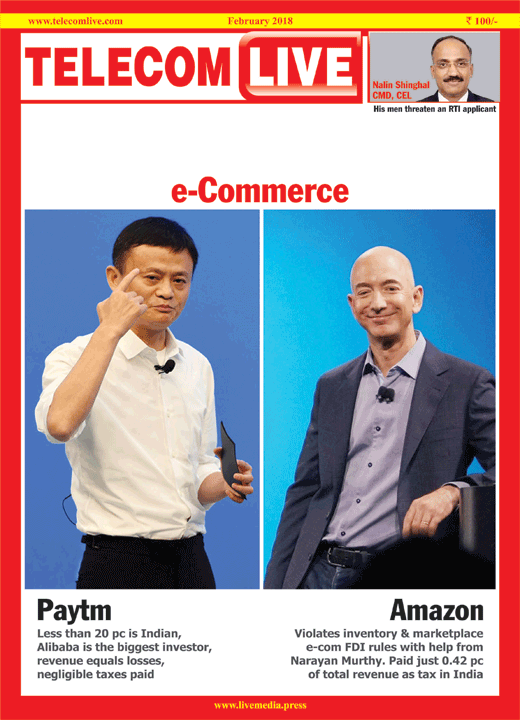This issue’s coverage of Amazon and Paytm is Part 2 in our E-com series. Through statistical output, diagrams and explanatory we highlight the tax avoidance conduct of these companies and in the case of Amazon, a reckless breach of FDI regulations governing inventory and the marketplace.
First, let’s look at the FDI regulations in India related to e-commerce. In India 100 pc FDI is permitted in B2B e-commerce. However, FDI was not permitted in B2C e-commerce earlier (till Mar 2016). But, many companies had started selling on B2C model. So the matter landed in Delhi High Court and the Court directed investigations into 21 e-com websites. During the pendency of the case, in March 2016, FDI norms were changed and 100 pc FDI was allowed in the marketplace, the restrictions on inventory were retained. The notification was issued on March 9, 2017.
A study of Amazon’s share pattern shows that India operation has 17 companies registered in India. Amazon Seller Services Pvt Ltd, operates the marketplace. Another entity to watch out for is Cloudtail India Pvt Ltd. While 100 pc FDI for marketplace was allowed, government disallowed dominance of one seller. The total sales of one vendor, was capped at 25 pc. Now, Cloudtail is the largest seller on Amazon Seller. It ended 2016, with a revenue of Rs 4,591 crore while the marketplace company, Amazon Seller made Rs 2,275 crore for the reported year. Cloudtail alone beat all other sellers put together on Amazon seller. A clear breach of 25 per cent cap!
Truth be told, Cloudtail is the story of how Amazon uses gaps in the law to continue to have a direct-selling model in the country. While the FDI was opened up for the marketplace, the restrictions remain for inventory based e-commerce.
Cloudtail is 100 pc owned by Prione Business Services Pvt Ltd. Prione is an intermediary structure in which Narayana Murthy and his relatives have a definitive role. The Indian regulation ignores FDI in the intermediary if more than 50 pc is vested in Indians. So, Amazon found Mr Murthy and thus Cloudtail can engage in direct selling, and it pays negligible tax. Details of these complex structures are laid out in the cover story.
Paytm is the other company that has been keenly analyzed. Controlled by One97 Communications Ltd, the Indian ownership of Paytm is well under 20 pc. It has two key investors – Chinese Internet giant, Alibaba (40 pc) and a non-transparent Mauritius based investor SAIF. It too has paid sundry amounts in tax.




